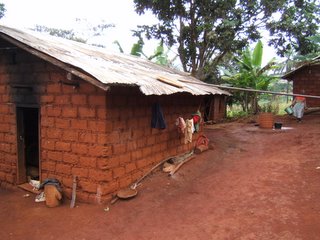words and "development"

I received the following text message last week: "pour un avenir meilleur, scolarisons tous nos enfants. Message UNICEF/MTN." In English, that's: "for a better future, let's put all our children in school. From UNICEF and MTN [a cell-phone company]." Thought provoking on many levels, no?
My fellow linguistics nerds may care to know that Medumba has what are sometimes called "verbal adjectives." These are words that, based on their semantics, speakers of European languages would expect to be adjectives, but "behave like" verbs; i.e., they head clauses, are inflected for tense and aspect, take nominal complements. An example of this is the word "zi," which in free translation means "big," but in literal translation is closer to "to be big." I don't know why, but I've always found verbal adjectives fun. So far, it seems to me that colours, anyway, are adjectives, but I may have a lot more to learn about adjectives and verbs yet. We'll see.
2 comments:
So "Zi" is something like the "biggifying" or "growing" (object), even though it just sounds like an adjective to us?
But isn't it really an adverbial usage with the verb implied?
You must explain further to the poor old minds back in Canada.
More seriously, Mom and I both got a laugh from an article on the back page of the Globe a few months ago about the "verbifying" of the English language that is taking place here. You can "impact" something now, not just have an impact on it. Armies can adopt a strategy to "attrit" the other side, not simply rely on attrition to solve their problems.
Of course, this is what guys like you are for, partly, to track the changes in language, not stop them, just keep a record of where we've been.
Poor old Shakesspeare if he was transported through time! One of the wisest men ever, but wouldn't get a bloody thing we're saying today.
Paul
i like the text message about education...something for me to think about. i heard a lot about education and development in Buea.
vi
Post a Comment